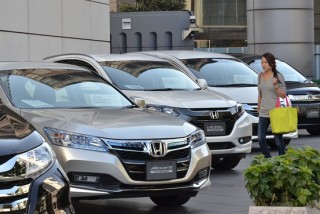Loading
Search
▼ Japan Car Makers Skid in China
- Category:Other

China’s slowing car market isn’t good news for any car brand. But it’s turning out to be especially bad for the Japanese.
The Hong Kong shares of Dongfeng Motor Monday after the Chinese joint-venture partner of Nissan, Honda and PSA Peugeot Citroën reported that its overall third-quarter earnings slumped 16% from the year before. The income it earned from these JVs.
Some slowdown in earnings would be understandable, considering Chinese car sales grew 8% year-over-year last quarter, compared with last year’s 16%. Yet Dongfeng’s Japanese JVs actually sold fewer cars during this period, down 14% at Nissan and 34% at Honda, says Sanford C. Bernstein. The PSA brands performed better.
These woes aren’t specific to Dongfeng. Guangzhou Automobile, another Hong Kong-listed car maker allied with Toyota, Honda and Fiat, also said last week that its third-quarter JV income fell 30% from a year ago.
Partly, individual Japanese brands have miscalculated. Honda set ambitious Chinese sales goals and shipped more cars to dealers than they could sell, forcing the company to trim its target last week. Its products also look old and, judging by the widening discounts dealers have to offer, sometimes too expensive. Nissan similarly shipped too many cars, now stuck in inventory.
These brands may also be experiencing a broader image problem. Chinese protesters smashed Japanese cars in 2012 when an island dispute boiled over into nationalist rage—a dispute that still simmers today. That’s one reason why a Bernstein-led survey of 40,000 Chinese consumers found that 51% would never consider owning a Japanese car. Japanese brands as a whole recovered a little bit of market share after the 2012 protests, but lost again this year, according to Macquarie data. The main winners are the German makers and Ford.
More such anti-Japanese sentiment bodes ill not only for Dongfeng and Guangzhou Auto, whose Japanese JVs typically drive earnings. It will also hurt Japanese car makers. In the year that ended March, Nissan sold 24% of its global volume in China and Honda 18%, says Nomura. Toyota is relatively insulated, selling only 9% of its cars in China and holding on to its position in China better this year.
The less enthusiastic Chinese consumers become about cars, the more they will get picky about car makers. Chinese brands are already losing out. The Japanese look like they’re next.
- November 4, 2014
- Comment (0)
- Trackback(0)

